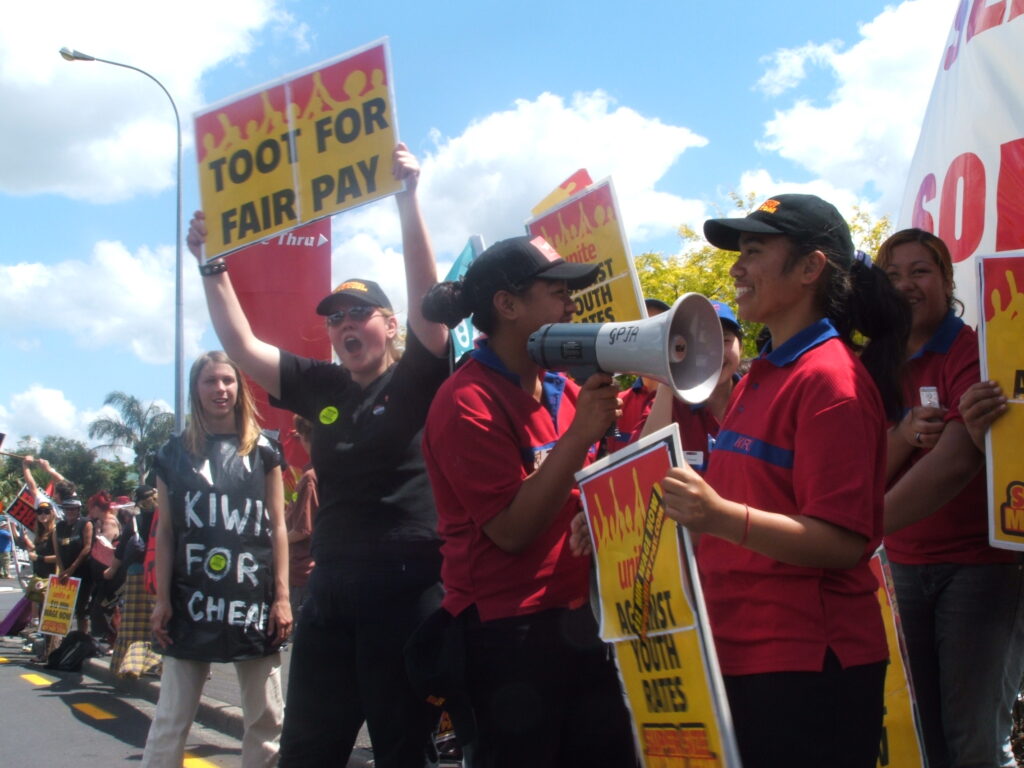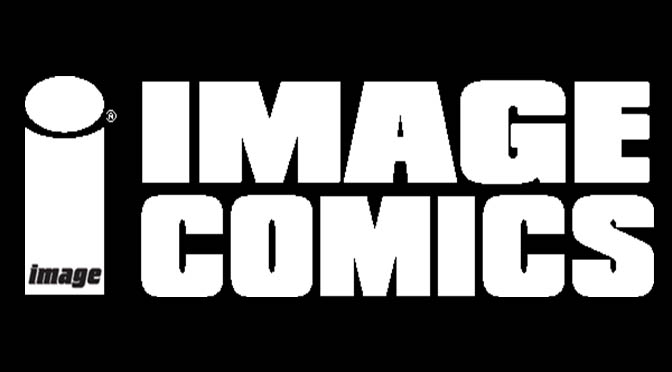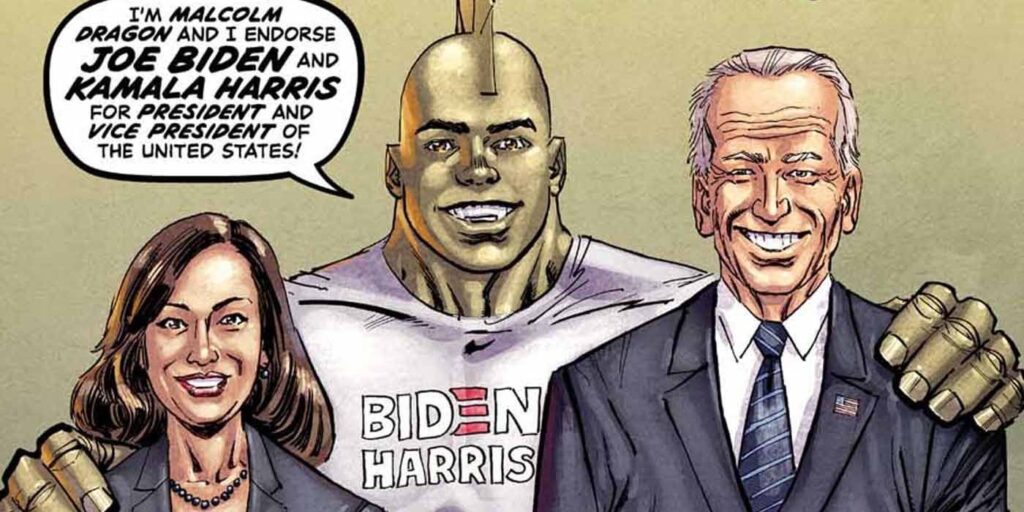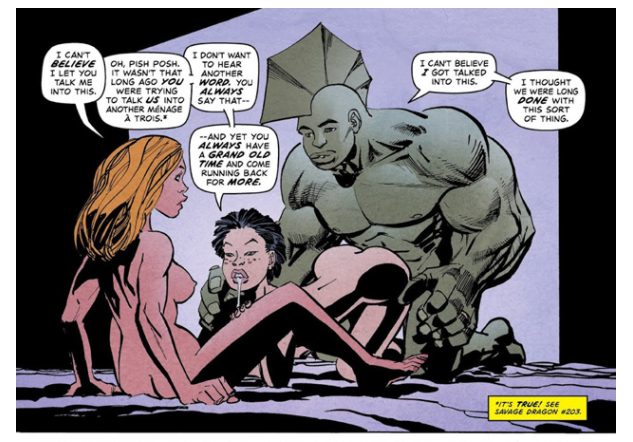
[ad_1]

Last week on Twitter, Comic Book Workers United (CBWU) declared that they had won their vote to unionize Image Comics. Twelve employees participated in the election, according to the tweets, but three ballots were disputed by Image and remained unopened. Nonetheless, by a supermajority of 7 to 2, the remaining employees decided to unionize, causing Image Comics to become the first comics publisher in the United States to do so. In the aftermath, Image must now acknowledge the union as a result of the vote. The CBWU went on to announce that they will collaborate with the Communications Workers of America (CWA) to negotiate a “strong, fair, and exemplary first contract for comic book industry workers.”
All 12 Image staffers submitted ballots, leading to a 7:2 result in favor of the union. At this time, three staffers’ ballots are subject to a frivolous legal challenge on eligibility, thus their ballots were not opened. 2/6
— Comic Book Workers United (@cbwupdx) January 7, 2022
Image Comics officially commented on the news by saying, “Everyone at Image is committed to this process and we look forward to continuing to work together on this.”
In a statement on the CBWU website, the group states: “For years, comics publishing workers have watched our professional efforts support creators and delight readers. Sadly, we have also watched that same labor be taken for granted at best and exploited at worst.” They added that “the comic book and publishing industry as a whole, is overtaxed and undervalued,” and that “our labor is integral to the comic book industry. It requires specialized skills, dedication, and makes quality publishing possible.”
They continue: “We love what we do. But loving what you do doesn’t mean you can’t or shouldn’t ask for improvements to your working conditions. It is with this in mind and with great hope for the future of Image Comics and the comic book industry itself that we announce our intent to form a union and request voluntary recognition.”
CWA was certainly open to helping the CBWU get organized. What organization doesn’t want to collect monthly dues? The group confirmed back in November that they were prepared to assist whichever comics workers were prepared to organize — and didn’t see the industry’s historical lack of organization as an issue. “Management in every industry in the United States has been hostile to union organizing — the comic book industry is no different,” a CWA rep says in a statement to THR. “What is different is that workers are fed up and ready to use the power they have when they join together to make real changes. When workers are ready to organize, we are ready to help them.”
The announcement of the union spurred a wave of support on social media by supporters across the industry, congratulating the ten Image Comics staffers involved in the effort—whose positions range across production, editorial, accounting, marketing, and sales—are Emilio Bautista, Ryan Brewer, Leanna Caunter, Marla Eizik, Drew Fitzgerald, Melissa Gifford, Chloe Ramos, Tricia Ramos, Jon Schlaffman, and Erika Schnatz. None of them are writers, pencillers, inkers, colorists, or letterers. These are all what would commonly be called “support staff”.

But although none of these staffers are on the creative side, mainstream comic book press outlets, who are overwhelmingly progressive at their core, were quick to cheer the move and frame this as a natural progression for Image Comics, being that the company’s origins are that of an independent house founded by comics artists looking for more creative control and ownership of their creations:
“Following in the footsteps of the company’s founders, the employees of Image have formed Comic Book Workers United… the first of its kind in the comic book industry… a natural evolution for the creator-owned publishing company.”
Source: Bell of Lost Souls
…”as other creative and adjacent fields around it have come to embrace unions, CBWU is currently a rarity.” Source: Gizmodo
“The Image Union Is the Future of Comics: We hope this is just the beginning of a tidal wave of unionization in this country. It’s long overdue.” Source: Vice
“Image Comics unionizing is a huge step for the industry…the first ever legally recognized comic book union. For an industry with a shameful past of mistreating both freelancers and staffers, it’s a move that recognizes the many gains that the industry had made since it began…” Source: The Beat
Those who embrace the need for a union in the comic book industry seem to be convinced that labor unions are primarily concerned about the wage earners. And many are convinced that a labor union can be the only thing that stands between the typical wage employee and a life of poverty, punishing work hours, and horrific working conditions. These people ignore the critical importance of falling prices in order to increase incomes. Most people believe that a higher pay scale is all that matters, especially in Joe Biden’s America, where we have chronic inflation and prices aren’t falling anywhere.
Real pay increases can only come from increased profitability, which is best done by increasing the output of each employee, which in turn increases the supply of goods and services produced relative to the supply of labor.

But how profitable is Image Comics right now? Or the comic book industry as a whole? When you ignore the high sales of imports like manga in the US, the Western comic book industry is in a slump. After all, comic books are literally discretionary items for consumers, and consequently, the drivers affecting the industry revolve around consumer choices and affordability. In an age of handheld computers, streaming movies, and online video games, comic books haven’t been able to hold their once esteemed ubiquitous position on the menu of preferred forms of entertainment menu for most consumers.
Who’s actually reading comic books today? Is it teenagers? Nostalgic adults? Investing collectors? People who saw the Marvel movies first? (If you’re 12 years old, are you going to read some comic book, or watch The Avengers?) Comic books now also have to compete with incredibly immersive videogames, virtual reality, and a gazillion cellphone apps — not to mention social media, and even online fan fiction.

As research outlets like IBISWorld point out, following the global pandemic and its effects on the economy, the publishing business, in fact the overall economy, is not likely to rebound for many years, if at all. Even before the pandemic, print advertising spending was already experiencing chronic decline, and is expected to continue to make a very sharp decline in 2022 which will keep print advertising levels depressed for the remainder of the year. Publishers are going to see even further reduced revenues from advertisement from their monthlies.
So as comics are becoming less popular and the publishing industry as a whole continues to remain depressed amidst a global recession, the challenge for Image Comics working with a newly formed employee union will do nothing to increase their profitability. In its strictest sense, it will decrease profitability and make their ability to become profitable more difficult. The central forcing function of a union is their strategy of restricting the number of workers in a company to drive up the remaining workers’ wages. This approach will delay any recovery Image Comics hopes to achieve in the current recession. And naturally the support staff’s higher wages are going to be passed on to Image’s readers through higher cover prices, while Image Comics earns even less profit. So while a union often benefits its members, they can also hurt consumers with the resulting increased prices.

It cannot be overemphasized, when a union is formed in a company, the prices go up. Unions argue that they can raise their members’ wages, but few Americans understand the economic theory explaining how they do this. Unions are “labor cartels,” in that they work by restricting the supply of what they produce so that consumers will have to pay higher prices for it. It’s really that simple. In Detroit, the UAW, like all union, helped its members at the expense of the rest of the economy. Detroit automakers passed along the cost of inefficient work rules and higher labor costs by raising their prices, that is until the automakers were forced into bankruptcy proceedings in 2008.
At the end of the day, the CBWU only represents Image Comics staff, and has no influence on independent contractors, freelancers, or creators. Officially, freelancers can’t unionize, but they may create guilds, and getting the combative and diverse comics business to agree to any type of unionizing attempt has proven useless over the years. Since several artists and colorists don’t even live or work in the U.S., that proposal is never going to work. It has never worked before, and it won’t work now.
In the case of Image Comics in 2022, if they are currently struggling to make a profit, even the CBWU members are not likely to see a wage increase any time soon. Unions don’t typically negotiate higher wages for newly organized workers. No, the unions save those “higher wages battles” for employees at companies with existing competitive advantages that allow them to pay higher wages, such as successful research and development (R&D) projects or capital investments. So even though Image Comics may be the third biggest comics publisher in America, they only have around a 10% market share, which doesn’t mean they have a competitive advantage, particularly in an industry that isn’t seeing much profit overall to begin with.

Over the past few years, Image’s maximum full time staff was only around 24, and they had to lay off 4 of those during the pandemic. And if Image still maintains their original pattern of only charging flat fee rates to creators for publishing fees, they really aren’t netting a lot of money. The publisher is currently offering 42 titles for sale, and a few of those are reprints. The last published sales figures we have are from late last year, and not counting manga (which is trouncing American comics) Image only had two comics in the top twenty, and those were both Spawn comics from Todd McFarlane and other than McFarlane’s books, they had no books in the top 40 sales chart.
But there are other reasons for Image to be concerned about unionized staffers. The company is headquartered in In Portland, Oregon, which is not a right to work state. In fact, the governor signed a bill recently that allows union member employees to be given paid time off to engage in union related activities, which can include strikes.
As demonstrated just last week in Buffalo, NY, the only unionized Starbuck’s in the country was held hostage by their recently unionized employees. After barely being unionized a full month, most of the staff walked off the job Wednesday, saying they lacked the resources to work safely amid surging COVID-19 cases. Six employees who had been scheduled to work formed a picket line outside the Buffalo store, leading Starbucks to close the coffee shop for the entire day.

And under the new law signed by the governor of Oregon, if this happens at Image Comics, those employees are still getting paid while they strike. So Image would be forced to pay its employees to stand in opposition to the company, rather than paying them to work.
That’s not all. Even to the most reasonable and rational person, while the new union’s list of demands are initially not problematic, their final demand borders on the absurd.
“a collective voting option to immediately cancel publication of any title whose creator(s) have been found to have engaged in abuse, sexual assault, racism and xenophobia, homophobia, transphobia, anti-Semitism, Islamophobia, ableism, etc. until such time as said creators have engaged in meaningful reparations toward affected person(s).”
Basically this means that if this group of production staff decides a creator on a book is “problematic,” they can immediately decide to cancel that book, even though the owners of Image had already decided to publish it. Isn’t this kind of judgment relative to the beholder? It recalls the incident a few years ago when one of the covers to the acclaimed Howard Chaykin series Divided States of Hysteria depicted a minority being lynched and his genitals cut off, staffers at Image had a meeting with management to discuss their problems with the comic, but that time it didn’t go quite the way they hoped.
“We were like please, if we’re gonna do this kind of work, it has to have artistic value, give us a heads up. Like, we’re affected by this,” David Brothers, an editor for comics publisher Viz who worked at Image Comics from 2013 through 2017, told Motherboard.
In the aftermath, Chaykin has tried to explain he is an ally of trans, but only wished to depict a tragic outcome in the story, but he has been effectively blackballed from the industry nonetheless. So how will the CBWU determine if a creator or comic is allowable at Image Comics. Will they scour a creator’s social media history for racial epitaphs? What if that creator voted for Trump or Hillary? Will this new union of ten people find openly bigoted creators like Gabby Rivera more or less problematic than Howard Chaykin? Would Dan Slott be more or less problematic than Mark Waid? Would they find Ethan Van Sciver more or less problematic than Ta-Nehisi Coates? I think you know where this is going. Isn’t it up to the owners of a company which creators and what products they want to bank on in order to show a profit?
So what are Image Comics options here? Obviously they are going to try to work under these new conditions. A bunch of left wing ideologues who are artists don’t set up shop in Portland, Oregon and not tow the line when it comes to supporting unions. Their COO treats Joe Biden like a god in his own creator owned title (when it isn’t featuring hardcore and child sex). But their only other options are hoping new employees won’t join the union, which is VERY unlikely given the environment. They could just sell the company to new owners who may or may not like the idea of buying a company that has a union contract and can pass the “substantial continuity” test, but I don’t think Image’s board would ever swallow their pride in order to sell off their creation. And their final option is nuclear… the company goes under and files for bankruptcy which may their only path to get rid of the union.

Why isn’t the cheerleading media asking questions like “How can unionizing help an industry that’s no longer profitable? How can a union help a company like Image Comics who’s becoming less profitable year after year?” And why aren’t they asking readers if they’re ready to accept higher costs attached to those comics?
But hey, these staffers could get more pay for less work, what’s not to like? Until they run the company into the ground of course. “Workers of the world, unite!”
For their part, Image tried to ignore this, hoping it would just go away, but it didn’t. But no one here really expected a bunch of lefties in Portland were ever going to push back very heard against a union. That’s just not how they roll in Portland. And where do we stand? Erik Larsen, the company’s COO, is ideologically against everything we stand for. He is a virulent progressive, aggressively agnostic, and has ridiculously exploited his own creation – Savage Dragon – to stump for liberal politics and feature disgusting pornographic imagery. Why should we care if the company goes down the toilet?

It’s their company to run into the ground if they like. And you can bet, some Image staff member, or even the COO himself, is going to read this and say “we’ll show those Nazis! Those ‘gaters! Those trolls… that we can make it work and Image Comics will set the example for workers in the industry to unite!”
Literally willing to cut off their nose to spite their face.
One-time BF contributor Wes Daugherity has a slightly more hopeful take here.
So while readers who enjoy the output at Image Comics may continue to hope they can manage to maintain a profit and support their new staffer overlords, it’s very, VERY unlikely that will be the outcome here. Fans of the medium can only hope this doesn’t become a destructive chain of events that upends the comic book industry forever.
Even if it does, there’s always crowdfunding.
[ad_2]





